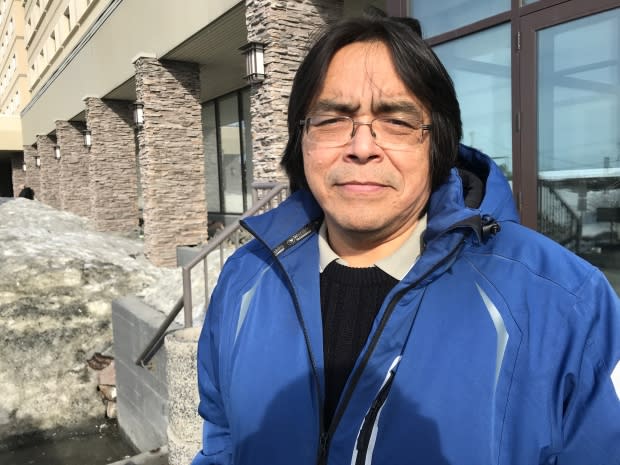Sixties Scoop survivors meet in Yellowknife for settlement info session
No amount of money can replace the hours Roy Dahl has spent feeling ostracized and alone after being taken from his home at five years old, growing up exiled from his Indigenous family.
But Dahl says his share from a settlement in a class-action lawsuit, filed on behalf of First Nations and Inuit children who were placed into foster care with or adopted by non-Indigenous parents, is a first step forward.
Dahl, a former CBC North broadcaster, was one of about two dozen people who attended an information session in Yellowknife on Monday for people interested in applying for a share in an $875-million settlement agreement between Sixties Scoop survivors and the federal government.
"I'm a shadow of the man I could have been," Dahl said.
"I think a lot of people in my circumstances — certainly involved with the Sixties Scoop — feel that sense of alienation, feel that sense of loss. We don't know what kind of people we could have become."
Dahl, who was born in Pikangikum, Ont., has been a member of the class-action lawsuit for about a decade. For him, the acknowledgement from the federal government that the Sixties Scoop was wrong is more important than the money.
"This settlement will never buy back that history for us, but it will at least give us some sort of foundation to improve our lives," he said. "This isn't the end of it. It's only the start of a process.
"At least it's an acknowledgement on the part of the government that something bad happened and they were the cause of it," he said.
Meetings happening across Canada
The administrator of the class action, Collectiva Class Action Services, organized Monday's meeting, one of 20 similar meetings that have been held across Canada this winter.
Company officials were there to help adoptees file their claims and answer questions about who is eligible for a share of the $750-million settlement that's been set aside for survivors.
The settlement also includes $50 million for a Sixties Scoop Healing Foundation and $75 million for legal fees.

Before Monday's meeting, Gail Cyr had been undecided about whether she would apply for her portion of the settlement. She's one of seven children in her family who were adopted out to non-Indigenous families in the 1960s.
"At first I was thinking, 'Do I or don't I,' and whether I want to open up a bunch of heartache," Cyr said. "Then I thought I'll come and attend and see what it's all about."
Like Dahl, Cyr felt a similar sense of isolation growing up. She was the only Indigenous person at her high school and did not know anything about her family, only reconnecting with one of her sisters later in life.
Later this summer, Cyr will be travelling to her home community of Nelson House, Man., to meet other members of her extended family for the first time.
For her, the settlement is more than about the money. She also says it's about the acknowledgement that the Sixties Scoop was wrong and a call for governments to do more for Indigenous families today.
"This is an important statement for governments to think twice," she said. "To help families, instead of just scooping the kids. Help them settle. Help them do whatever they need to do to provide for their families."
Another meeting for Sixties Scoop survivors has been set for Iqaluit in April. The deadline for submitting a claim is Aug. 31.

